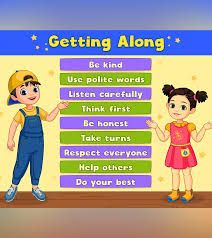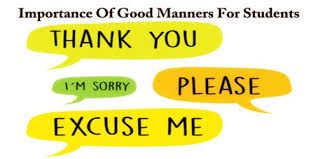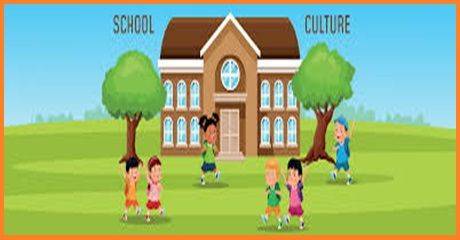The Impact of Manners on the School Environment, Manners, often regarded as the social lubricant that facilitates positive interactions and relationships, play a crucial role in shaping the school environment….
The Impact of Manners on the School Environment
Introduction
The Impact of Manners on the School Environment, Manners, often regarded as the social lubricant that facilitates positive interactions and relationships, play a crucial role in shaping the school environment. Beyond their traditional association with etiquette and politeness, manners encompass a broader spectrum of behaviors that contribute to a respectful, harmonious, and conducive educational atmosphere. In this article, we explore the multifaceted impact of manners on the school environment, examining how they influence student behavior, interpersonal relationships, academic performance, and overall school culture.

Defining Manners in the School Context
In the context of schools, manners encompass a set of behaviors and attitudes that reflect respect, consideration, and empathy towards others. These behaviors go beyond basic etiquette and politeness to include aspects such as:
- Respectful Communication: Using courteous language, active listening, and acknowledging others’ perspectives.
- Consideration for Others: Being mindful of personal space, noise levels, and the impact of one’s actions on others.
- Empathy and Kindness: Showing compassion, empathy, and helping others in need.
- Conflict Resolution Skills: Handling disagreements or conflicts constructively and peacefully.
Impact of Manners on Student Behavior
Manners significantly influence how students behave and interact within the school environment:
- Promotion of Respect: Practicing good manners fosters an atmosphere of mutual respect among students, teachers, and staff.
- Reduction of Disruptive Behavior: When students are mindful of their manners, there tends to be a decrease in disruptive behaviors such as rudeness, bullying, and vandalism.
- Enhanced Classroom Atmosphere: Polite and respectful behavior contributes to a positive classroom atmosphere, conducive to learning and participation.
Manners and Academic Performance
The relationship between manners and academic performance is nuanced but impactful:
- Improved Focus and Concentration: A respectful and orderly environment allows students to concentrate better on their studies, leading to improved academic outcomes.
- Positive Teacher-Student Relationships: Good manners enhance rapport between teachers and students, facilitating effective teaching and learning experiences.
- Promotion of Responsibility: Manners instill a sense of responsibility and self-discipline in students, traits that are crucial for academic success.

Influence on Interpersonal Relationships
Manners play a pivotal role in shaping interpersonal dynamics among students and between students and faculty:
- Building Positive Relationships: Politeness and respect create a foundation for positive relationships, fostering a supportive and inclusive school community.
- Conflict Resolution: Students who practice good manners are better equipped to resolve conflicts peacefully and constructively, promoting harmony within the school.
- Peer Influence: Students with good manners serve as role models, influencing their peers positively and contributing to a culture of kindness and cooperation.
Manners and School Culture
The collective manners of students and staff contribute to the overall school culture:
- Cultural Norms: Manners establish cultural norms within the school, defining acceptable behavior and promoting a sense of belonging.
- Atmosphere of Safety and Well-being: Respectful behavior enhances feelings of safety and well-being among students, creating an environment conducive to personal and academic growth.
- Community Engagement: Schools that emphasize manners often extend these values to the broader community, fostering partnerships and positive public perception.
Teaching and Encouraging Manners
Educators play a pivotal role in teaching and encouraging manners among students:
- Curriculum Integration: Manners can be integrated into the curriculum through activities, discussions, and role-playing exercises.
- Modeling Behavior: Teachers serve as role models by demonstrating and reinforcing good manners in their interactions with students and colleagues.
- Parental Involvement: Collaboration with parents is essential in promoting consistent reinforcement of manners both at home and at school.
Challenges and Solutions
Despite the benefits, promoting manners in schools may face challenges:
- Cultural Differences: Different cultural backgrounds may influence perceptions of manners, requiring sensitivity and adaptation in promoting universal principles of respect and kindness.
- Consistency: Ensuring consistent enforcement and reinforcement of manners across all school settings and among all stakeholders can be challenging but crucial for efficacy.
- Addressing Resistance: Some students may resist adopting manners due to peer influence or personal beliefs, necessitating targeted interventions and support.
Conclusion
In conclusion, manners profoundly impact the school environment by shaping behavior, fostering positive relationships, enhancing academic performance, and contributing to a supportive school culture. Beyond their role in etiquette, manners promote respect, empathy, and responsibility among students, preparing them for success in both academic and personal endeavors. Educators, parents, and students themselves all play integral roles in cultivating and maintaining a culture of manners within schools, ensuring a conducive and enriching educational experience for all.
Embracing and prioritizing manners in schools not only benefits individual students but also contributes to the overall well-being and success of the entire school community. As educators and stakeholders continue to recognize the significance of manners, they pave the way for a more inclusive, respectful, and harmonious school environment.

2lnha3
ppltc6
Valuable information. Fortunate me I found your website by chance, and I am shocked why this accident did not happened earlier! I bookmarked it.
gli5wg
Fabulous, what a webpage it is! This webpage gives
helpful facts to us, keep it up.
Here is my web-site :: nordvpn coupons inspiresensation
Keep functioning ,remarkable job!
Thank you for the auspicious writeup. It in fact was a amusement account it. Look advanced to more added agreeable from you! However, how could we communicate?
Thanks a bunch for sharing this with all of us you really know what you are talking about! Bookmarked. Please also visit my web site =). We could have a link exchange agreement between us!
I loved as much as you’ll receive carried out right here. The sketch is tasteful, your authored subject matter stylish. nonetheless, you command get bought an nervousness over that you wish be delivering the following. unwell unquestionably come further formerly again since exactly the same nearly a lot often inside case you shield this hike.
I was very pleased to find this net-site.I wished to thanks in your time for this glorious read!! I positively enjoying each little little bit of it and I’ve you bookmarked to check out new stuff you weblog post.
Generally I don’t learn article on blogs, but I would like to say that this write-up very compelled me to try and do so! Your writing taste has been surprised me. Thanks, quite nice article.
I don’t even know how I stopped up here, however I thought this publish used to be good. I don’t recognize who you are however definitely you are going to a famous blogger for those who are not already 😉 Cheers!
Turkey adventure tours Excellent Turkey tour packages. The Islamic heritage sites were beautifully maintained and inspiring. http://electromecanicamx.com/?p=60977
Such a thoughtful and well-researched piece. Thank you.
Thank you for offering such practical guidance.
Such a simple yet powerful message. Thanks for this.
I like how you presented both sides of the argument fairly.
I’ll definitely come back and read more of your content.
This was easy to follow, even for someone new like me.
Such a simple yet powerful message. Thanks for this.
What a great resource. I’ll be referring back to this often.
I never thought about it that way before. Great insight!
Such a simple yet powerful message. Thanks for this.
This gave me a whole new perspective. Thanks for opening my eyes.
Such a thoughtful and well-researched piece. Thank you.
I must say this article is extremely well written, insightful, and packed with valuable knowledge that shows the author’s deep expertise on the subject, and I truly appreciate the time and effort that has gone into creating such high-quality content because it is not only helpful but also inspiring for readers like me who are always looking for trustworthy resources online. Keep up the good work and write more. i am a follower.
F*ckin¦ awesome things here. I am very satisfied to peer your article. Thank you so much and i’m having a look forward to touch you. Will you kindly drop me a e-mail?
This is really interesting, You are a very skilled blogger. I’ve joined your feed and look forward to seeking more of your great post. Also, I have shared your website in my social networks!
I am continuously browsing online for articles that can facilitate me. Thank you!
The next time I read a blog, I hope that it doesnt disappoint me as much as this one. I mean, I know it was my choice to read, but I actually thought youd have something interesting to say. All I hear is a bunch of whining about something that you could fix if you werent too busy looking for attention.
I got good info from your blog